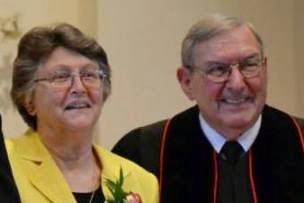From My Perspective - - -
There's an old expression regarding “the day after the night before” which pertains to the partying practices of different cultural groups in the world. It usually has reference to the “hangover” that some experience from their excessive drinking and consumption of alcoholic beverages the “night before”! For such a one, “the day after the night before” can be a miserable one as blurred vision and headaches accompany one in the process of becoming “sober” and functional.
However, “the day after the night before” has a different tradition, observance and reference than a binge with which one has inflicted himself/herself. Particularly in the British Empire, it has reference to the day following Christmas – December 26th is observed as St. Stephen’s Day. “St. Steven's Day is an official holiday in Italy, Finland, Ireland and some other countries. It is also celebrated in some other countries as an official or unofficial holiday. In England and the English speaking Commonwealth countries it is known as Boxing Day and celebrated as an official holiday under that name. In Ireland, December 26th is celebrated under the name of St. Stephen's Day or sometimes referred to as Wren Day. Today the holiday is celebrated in Ireland very much like Boxing Day is celebrated in nearby England. But much of the lore of the day centers around a little bird known as the wren. In rural Ireland in times past, groups of young men and boys would dress in old clothes and blacken their faces. They would then capture and kill a wren, and march from house to house, carrying the dead wren on the top of a pole, and asking for a treat or money to bury the wren.” It is a strange way to commemorate a day bearing the name of one who was very significant in Christian and Biblical History.
We first read about Stephen in Acts 6. As the Church was expanding and growing, the Apostles were directed to find godly men who would be able to assist in aspects of ministry – especially the care of widows (and presumably orphans). The requirement for those to assist in a Diaconal role is stated in Acts 6:2-5, “Then the twelve summoned the multitude of the disciples and said, It is not desirable that we should leave the word of God and serve tables. Therefore, brethren, seek out from among you seven men of good reputation, full of the Holy Spirit and wisdom, whom we may appoint over this business; but we will give ourselves continually to prayer and to the ministry of the word. And the saying pleased the whole multitude. And they chose Stephen, a man full of faith and the Holy Spirit (along with six others)…” In Acts 2:8-15, a summary of Stephen’s life, character and ministry is given: “…Stephen, full of faith and power, did great wonders and signs among the people. Then there arose some from what is called the Synagogue of the Freedmen…disputing with Stephen. And they were not able to resist the wisdom and the Spirit by which he spoke. Then they secretly induced men to say, We have heard him speak blasphemous words against Moses and God. And they stirred up the people, the elders, and the scribes; and they came upon him, seized him, and brought him to the council…And all who sat in the council, looking steadfastly at him, saw his face as the face of an angel.”
The result of the wicked scheming of the Freedmen is given in Acts 7:55-58, Stephen “…being full of the Holy Spirit, gazed into heaven and saw the glory of God, and Jesus standing at the right hand of God, and said, Look! I see the heavens opened and the Son of Man standing at the right hand of God! Then they cried out with a loud voice, stopped their ears, and ran at him with one accord; and they cast him out of the city and stoned him.” Stephen became the first Martyr of the Christian Church. Rather than the day being observed with the frivolity of a Boxing Day or a Day of the Wren, it should be commemorated as a day for noting the cost of true discipleship and a challenge to us all to have the same confidence, hope, courage and commitment to implement Ephesians 6:13, “…take up the whole armor of God, that you may be able to withstand in the evil day, and having done all, to stand.” Consider these things with me!




